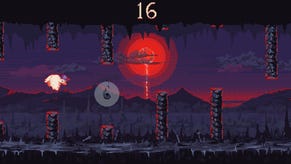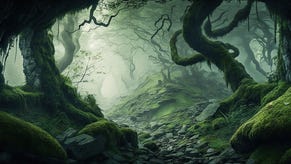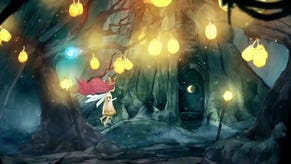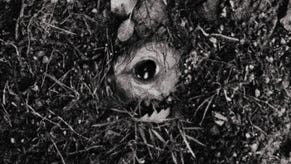I came to Dark Souls so late that it's basically like going to Disneyland
https://cms.eurogamer.net/cms/article.php#
Shortly after I started playing Dark Souls this spring, I discovered a tiny chunk of Lordran in Brighton, where I live. The Madeira Lift - which even sounds like Dark Souls - is a 19th century elevator, originally operated by a hydraulic pump, that links Marine Parade on the seafront with Madeira Drive below it. A cliff with its own lift! It looks like Dark Souls: it's accessed at the Marine Parade end via a little building done up in the Oriental style, complete with dragon finials, and when you travel down, you're in a rickety box that offers a view of sooty, cobweb-scribbled piping chugging past. Sure, you end up in the concert venue in which I once saw Elastica, but it's still dark and dingy and illicit-feeling down there. The lift is not well known. It has a full-time operator, and yet it feels like a local secret. I've started using it all the time. It's brilliant. It's a brilliant secret lift.
More than anything, the Madeira Lift feels like Dark Souls because it's a neat environmental hack. It short-circuits a rather knackering bit of urban design. If you want to walk from the bus stop near the hospital on Marine Parade down to the beachside playground my daughter loves, you're in for a ten minute detour - unless you know about the lift. The lift makes you realise that two seemingly distant points are actually so close that they almost touch. What could be more like Lordran than that?
Dark Souls, in other words, changes the way that you see the world. As its map evolves into an elegant and sometimes pedantic series of ox-bows and hairpins, you start to look at your own environment a little differently. But in my case, coming to the game so late, the world has also changed how I've seen Dark Souls. There's never been a game like this. There's never been a game that is famous in quite the way that Dark Souls is famous. Last month a few friends of mine actually wrote a book about the game. I am saving it for the completion of my first playthrough, but I can't think of many other games that have this kind of book as an accompaniment: part guide, part reverie, part attempt to understand the strange power of a mysterious piece of software in which people have spent long and impactful stretches of their own lives.

Dark Souls is so unusual, in fact, that it is a different game to someone discovering it now than it was to someone discovering it in the weeks after its release. Not because of balance patches. Not because of the DSfix on PC. But because time and recognition have changed the game, just as time and fluctuating popularity have changed the Madeira Lift from a bustling Victorian thoroughfare that carried thousands each summer to a rickety backstairs secret known only to a few (hipsters).
I know all of this because it feels like I have seen both sides of the game - or both sides of the series, anyway. When Demon's Souls came out for PS3, I was a distant witness, and the thing I was witnessing reminded me a little bit of something I once read about the perfect way to encounter the movie The Blair Witch Project. The perfect way to encounter this film, it turns out, is not in a packed cinema or through the bland interface of a streaming service when you're looking for something to watch on Halloween. The perfect way to encounter this film is to have someone press a battered videotape into your hands. You've never heard of The Blair Witch Project in this scenario, and you still have access to a VCR. You plug in the tape one night and - what is this? Is it real? Is it fiction? What are the rules that direct your viewing of it? What is the frame of this, the correct context for this murky trip into the woods?
Demon's Souls. I used to meet Simon Parkin for lunch every week or so just to hear about this weird, difficult Japanese game he was playing. It was a game that seemed straightforward enough - you're wearing armour, you're holding a sword, and there are plenty of people who you need to smack around a bit - but it explained nothing of itself, and even its simplest surface was deceptive and liable to give way, at any second, to great shadowy depths. One lunchtime, Parkin told me that he'd been poisoned by something, and his health was dripping away and he simply didn't know what to do. It wasn't like being poisoned in any other game, because any other game would forget about it sooner or later. Another time, he told me about a ring he had found that didn't seem to do much when he put it on. Another time he told me about a bizarre multiplayer system, a bizarre messaging system. Everything in the game appeared to be without precedent, or rather everything in the game took standard video game elements - PvP, loot, bosses - and acted like it was creating them over from scratch. You were exploring a landscape, but you were also exploring a design, a design ethos. You were exploring a sense of what games could be.
That's how the Dark Souls pioneers encountered Demon's Souls' sequel, I think, only this time the world was no longer an instanced thing of levels, but an interlinked and deviously coherent network of actual places, each one - and the emerging paths that it opened up - reinforcing the integrity and substance of the others, bolstering the fantasy until fantasy was the last thing it felt like. I would love to have come to Dark Souls at this time, to be amongst the first into the Undead Burg, the first to realise you could roll off the elevator from the Undead Parish as it was starting to move. I would love to have discovered for myself that you could shoot the dragon's tail to get the Drake Sword rather than being told about it by three or four separate people who had all heard that I was struggling in the opening stages.
But actually, that gets us back to how I did discover Dark Souls eventually. And this approach is not without its merits either.
I came to Dark Souls earlier this year for the very reason that Dark Souls was an entirely known quantity - and I wanted to see it for myself. I wanted to feel that rush of understanding, that instance of the fingerpost, as a trip through a doorway put me back somewhere I recognised but felt that I had left far behind me. I wanted to feel the crush of defeat giving way to slow progress.
And I found all this. I found it all! Over the last few months, I have been playing a game that is a series of epiphanies, and the epiphanies are all now cliches. Dark Souls is hard, but it isn't unfair! Who knew? Everybody, actually! Absolutely everybody. Dark Souls is a canny piece of psychological design! Who knew? Everybody who has picked up the Drake Sword when they really needed a foothold in this world, and then gradually learned that it was great and powerful, but that it wouldn't last forever. It was there to give you a boost in stats, but it would not evolve beyond its starting numbers. In other words, the Drake Sword covers the period in which you need to make some kind of progress, even cheap progress, and it leaves you - or it makes you leave it - just as you are emotionally ready to start understanding the deeper systems of combat, of making your kit better, of making your character and their weapons stronger in a legitimate manner. It circumvents the game's unwavering design when you need to circumvent it, so that the design itself can remain unwavering.
In amidst these herd epiphanies, though, in amidst the jolts that Dark Souls provides to every one of its players in exactly the same way, I started to experience something that only people who come to the game late will get to experience: I started to realise that I was so late to this marvelous game that I had missed the pioneer period entirely. The cartographers had done their work. Instead, I was a tourist in Lordran.
I noticed this pretty early, actually. When I first travelled from the Undead Asylum, clutching a giant bird thing as I raced through the louring skies, I landed at the Firelink Shrine and thought: Oh god, the Firelink Shrine! I've heard about this place! It's super famous, and here it is! And in its boggy, rainy greens and greys, it is exactly as I expected it to be.
And when I wandered around the shrine a bit, it started to dawn on me: this is the feeling you get when you finally see the Pyramids at Giza. Or when you finally see The Haunted Mansion in Disneyland. Lordran is a place! It is a place that its players have made their own, and then returned from and spread stories of. Artificial as it is, it has gone beyond a suite of stages and clever bits of design and become a world in and of itself. You don't play Dark Souls so much as go there - on holiday. Sure, you have the same experiences everyone else does a lot of the time, and you feel the footsteps of those who have come before you all the time, but isn't that what being on holiday is like? This fame, as my friend Jason Killingsworth once explained to me, is not the kind of fame that renders something tacky, that stops you from seeing it. It is the kind of fame that makes something exalted.
And if I have lost a little of the mystery - not all of it, of course, because Dark Souls really is something special - I have gained a lot in very simple terms. I am surviving! In this taxing, inhospitable world, with my terrible gaming skills, I am putting one foot in front of the other and making progress!
Sure, it's slow progress, but again, isn't that the progress of a tourist, on their fifth trip to New York, finally staying in the area they know they like the most, finally realising that Rockefeller is a better climb than the Empire State Building because you can book a time slot and because you can then see the Empire State Building, which is so much more New Yorkish than being stuck at the top of it?
If anything - and stop me if you've heard this one before - I'm finding Dark Souls relaxing rather than gruelling. Not because I'm good at it. I'm terrible at it, I die all the time, bosses stop me dead for weeks and I am constantly getting lost. I'm finding it relaxing because the game's internal rhythm is as perfect for tourism as the game's lore and detailing and set-pieces are for turning it into a tourist destination in the first place. Those bonfires that bring you back to full strength but also reset the world around you and its beasts! Those Estus flasks that give you a sense of your time on earth ticking away as they drain! Dark Souls is a jeweler's loupe. It is a game about moving a little lens over a vast, complex map. It's a lens of health - five or ten flasks deep - and it's a lens of time, generally about a half hour or so until I'm either dead, almost dead, or up against another bonfire or something I can't face just yet. Dark Souls is a game about day-tripping. It's literally jaunty.
And finally, I think you can see all of this in something quite simple. Like any tourist destination, Dark Souls now offers not one map but a range of them - a cartographic lunch wagon in which you can choose the perspective that fits for the next five minutes or so. Sometimes I navigate by wiki. Sometime I play with a streamer chatting in my ear, tempting me to avoid the Capra Demon head on and instead lob fire bombs over the wall. (This works!) Sometimes, I pick my path by using one of the many glorious attempts to draw all of Lordran from a single vantage point. And sometimes? Sometimes I remember my first trip on the Madeira Lift. I wait by the door, building up the courage to see what's on the other side.










